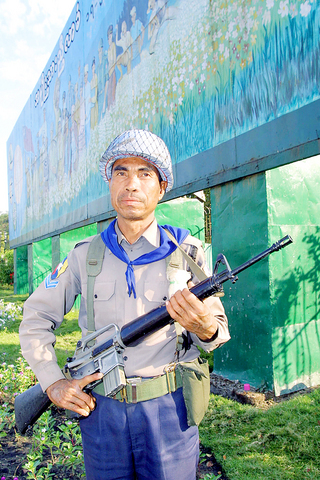With Myanmar's military junta facing increasing international isolation, Prime Minister Soe Win heads to China this week expecting to expand ties with his nation's strongest and most loyal ally.
Even as Myanmar's fellow Southeast Asian neighbors show growing signs of unhappiness over the regime's political and human rights records, China has remained solidly behind the generals while looking to broaden trade links.
"We expect that this visit will further expand and deepen the traditional friendship between China and Myanmar," Chinese Foreign Ministry Spokesman Kong Quan (

PHOTO: AFP
Kong said the two nations would sign trade agreements during Soe Win's four-day trip, while he is scheduled to receive red carpet treatment during meetings with Chinese President Hu Jintao (
However the UN's former envoy to Myanmar, Razali Ismail, called on China to start pressuring the junta to reform.
"China has a critical role to play in the efforts to bring reforms and democracy in Myanmar," said Razali, a Malaysian diplomat who resigned in frustration in December after being denied access to the country for two years. "The Chinese know if they exert the political will, they can get Myanmar back on the track towards reforms. China is extremely close with Myanmar."
China, however, has given no indication it will encourage the junta to reform, with Kong insisting his government will not deviate from its strict policy of not interfering in Myanmar's "internal affairs."
Ralph Cossa, director of the Pacific Forum think tank at the Center for Strategic and International Studies, said China's stance had become more important for the junta as other regional governments abandoned them.
For a long time, ASEAN had followed a similar policy of "non-interference" with member Myanmar, but last year demanded it move towards democracy and release opposition leader Aung San Suu Kyi.
"China has become not only an important economic contributor, but also its political protector," Cossa said.
Cossa said this support had become "critical" in multilateral forums, with China lobbying other nations privately and publicly to avoid placing pressure on Myanmar's generals.
"You see the Chinese at every one of these meetings speaking out for Myanmar. No one else is carrying the flag for them. Politically it helps to take some of the heat off Myanmar," he said.
The US said last week it was considering introducing a resolution at the UN Security Council to step up international pressure on Myanmar over rights abuses.
China, a permanent member of the Security Council, would likely veto any such move, with Myanmar so confident of the fact that Soe Win would not even raise the matter this week, a former Thai ambassador to the UN said.

Incumbent Ecuadoran President Daniel Noboa on Sunday claimed a runaway victory in the nation’s presidential election, after voters endorsed the young leader’s “iron fist” approach to rampant cartel violence. With more than 90 percent of the votes counted, the National Election Council said Noboa had an unassailable 12-point lead over his leftist rival Luisa Gonzalez. Official results showed Noboa with 56 percent of the vote, against Gonzalez’s 44 percent — a far bigger winning margin than expected after a virtual tie in the first round. Speaking to jubilant supporters in his hometown of Olon, the 37-year-old president claimed a “historic victory.” “A huge hug

Two Belgian teenagers on Tuesday were charged with wildlife piracy after they were found with thousands of ants packed in test tubes in what Kenyan authorities said was part of a trend in trafficking smaller and lesser-known species. Lornoy David and Seppe Lodewijckx, two 19-year-olds who were arrested on April 5 with 5,000 ants at a guest house, appeared distraught during their appearance before a magistrate in Nairobi and were comforted in the courtroom by relatives. They told the magistrate that they were collecting the ants for fun and did not know that it was illegal. In a separate criminal case, Kenyan Dennis

A judge in Bangladesh issued an arrest warrant for the British member of parliament and former British economic secretary to the treasury Tulip Siddiq, who is a niece of former Bangladeshi prime minister Sheikh Hasina, who was ousted in August last year in a mass uprising that ended her 15-year rule. The Bangladeshi Anti-Corruption Commission has been investigating allegations against Siddiq that she and her family members, including Hasina, illegally received land in a state-owned township project near Dhaka, the capital. Senior Special Judge of Dhaka Metropolitan Zakir Hossain passed the order on Sunday, after considering charges in three separate cases filed

APPORTIONING BLAME: The US president said that there were ‘millions of people dead because of three people’ — Vladimir Putin, Joe Biden and Volodymyr Zelenskiy US President Donald Trump on Monday resumed his attempts to blame Ukrainian President Volodymyr Zelenskiy for Russia’s invasion, falsely accusing him of responsibility for “millions” of deaths. Trump — who had a blazing public row in the Oval Office with Zelenskiy six weeks ago — said the Ukranian shared the blame with Russian President Vladimir Putin, who ordered the February 2022 invasion, and then-US president Joe Biden. Trump told reporters that there were “millions of people dead because of three people.” “Let’s say Putin No. 1, but let’s say Biden, who had no idea what the hell he was doing, No. 2, and